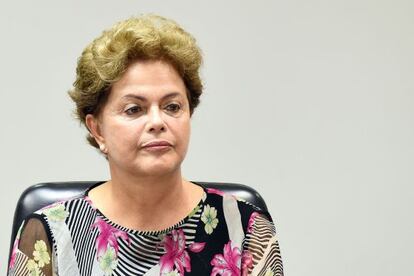Brazil’s leader appeals for austerity as Petrobras graft case widens
Opposition planning marches to demand impeachment proceedings against Rousseff


President Dilma Rousseff asked Brazilians on Sunday night to make painful but temporary sacrifices to get the economy rolling, explaining that cuts were needed to bring the country out of recession.
“It is necessary to change the methodology,” she said in a televised address that coincided with International Women’s Day.
“During the first stage of the economic crisis, Brazil held its own and continued to grow while in other countries jobs were being lost. But no one could have predicted that this crisis was going to last such a long time.”
Hundreds of Brazilians jeered from their windows and banged pots and pans during the president’s speech
In a rare occurrence during a live presidential address, hundreds of Brazilians in middle-class neighborhoods in São Paulo and other cities jeered from their windows and banged pots and pans to protest against Rousseff’s new policies and demand justice in the widening corruption case at the state-run oil company Petrobras.
Opposition organizers are planning for massive marches next Saturday across the country to demand that Brazilian Congress begin impeachment proceedings against Rousseff, who was recently sworn in to a second term.
The government has moved to cut public spending at the different ministries and agencies while at the same time raising consumer energy prices. Brazil’s inflation rate has reached 7.7 percent, the highest figure since 2005.
“I know that some of you are conscious that energy prices have gone up and that this has also affected some costs for food. But these are temporary sacrifices,” Rousseff said, while also citing the effect of the severe unprecedented drought in São Paulo state.
Some in the president’s own Workers’ Party (PT) have come out against Rousseff’s plans to also cut unemployment and social security benefits. Last week, the Senate rejected a government proposal that would have raised payroll taxes paid by businesses.
But despite the growing recession, Rousseff insisted that Brazil was not suffering “a financial crisis like the ones other countries have gone through.”
“Brazil now has solid bases to once again grow as soon as we solve our problems,” she said.
But aside from the economy, Rousseff is having to deal with a mammoth political scandal brewing from a multi-million-dollar graft investigation at Petrobras.
The Supreme Court said the investigation should continue against 47 suspects in the Petrobras case
On Friday, the Supreme Court gave the green light for the investigation to continue against 47 suspects in the Petrobras case, including the speakers in both chambers of Congress, and many in Rousseff’s PT party.
According to prosecutors, some of Brazil’s biggest construction and engineering firms paid some $800 million in bribes to Petrobras officials and politicians in order to win contracts at the state oil company.
Attorney General Rodrigo Janot has asked the court not to investigate Rousseff, even though a leading cooperating witness said she was privy to the scheme.
The president briefly touched on the matter during her Sunday-night address.
“Brazil has already learned what must be done with corruption. This is what is happening in the independent and energetic Petrobras case investigation,” she said.
Tu suscripción se está usando en otro dispositivo
¿Quieres añadir otro usuario a tu suscripción?
Si continúas leyendo en este dispositivo, no se podrá leer en el otro.
FlechaTu suscripción se está usando en otro dispositivo y solo puedes acceder a EL PAÍS desde un dispositivo a la vez.
Si quieres compartir tu cuenta, cambia tu suscripción a la modalidad Premium, así podrás añadir otro usuario. Cada uno accederá con su propia cuenta de email, lo que os permitirá personalizar vuestra experiencia en EL PAÍS.
¿Tienes una suscripción de empresa? Accede aquí para contratar más cuentas.
En el caso de no saber quién está usando tu cuenta, te recomendamos cambiar tu contraseña aquí.
Si decides continuar compartiendo tu cuenta, este mensaje se mostrará en tu dispositivo y en el de la otra persona que está usando tu cuenta de forma indefinida, afectando a tu experiencia de lectura. Puedes consultar aquí los términos y condiciones de la suscripción digital.








































